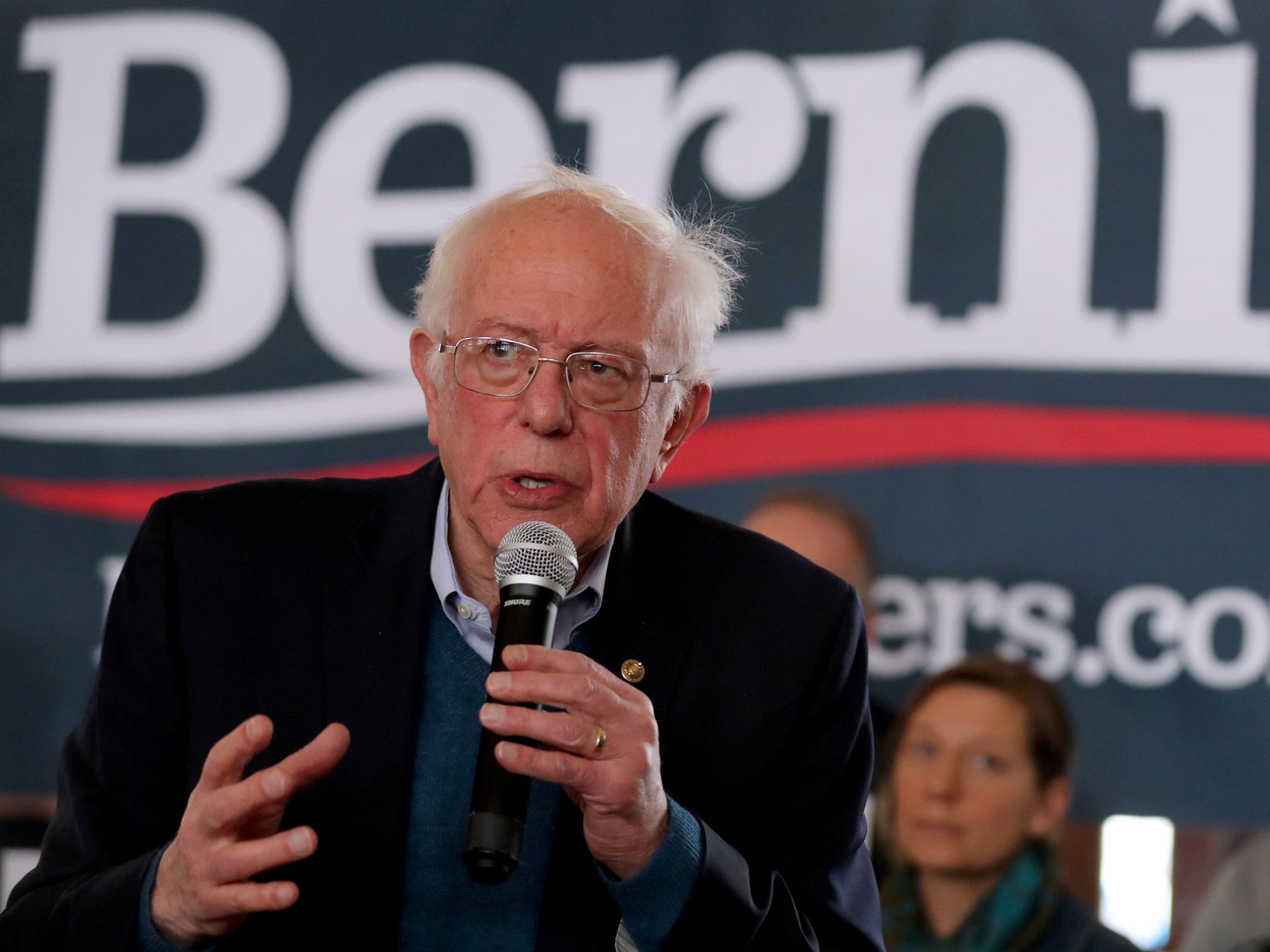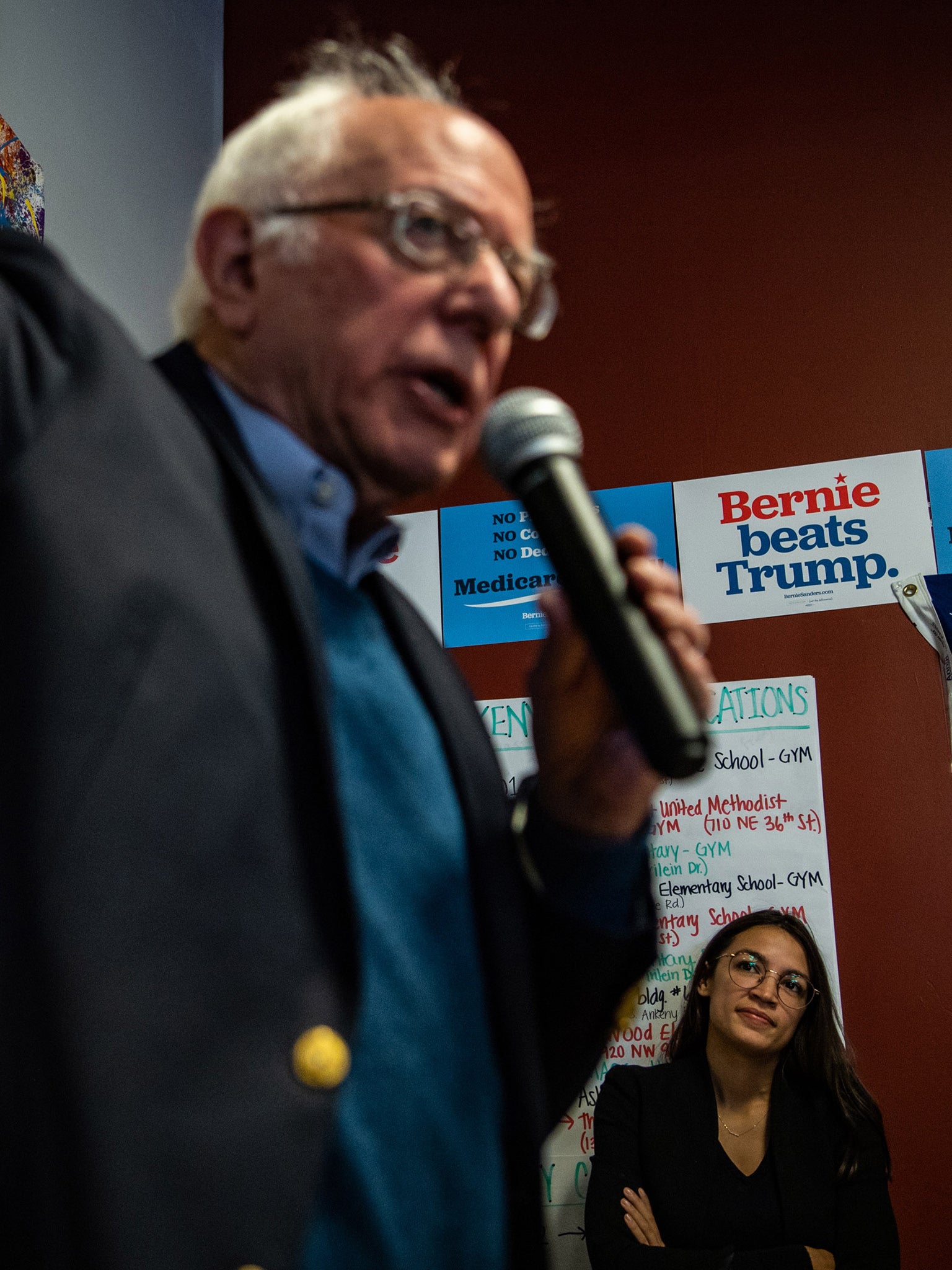Pete Buttigieg insists Bernie Sanders ‘can’t beat Trump’ after senator surges in polls
Vermont veteran is a ‘risk we can’t take’, warns rival ahead of first Democratic primary

Your support helps us to tell the story
From reproductive rights to climate change to Big Tech, The Independent is on the ground when the story is developing. Whether it's investigating the financials of Elon Musk's pro-Trump PAC or producing our latest documentary, 'The A Word', which shines a light on the American women fighting for reproductive rights, we know how important it is to parse out the facts from the messaging.
At such a critical moment in US history, we need reporters on the ground. Your donation allows us to keep sending journalists to speak to both sides of the story.
The Independent is trusted by Americans across the entire political spectrum. And unlike many other quality news outlets, we choose not to lock Americans out of our reporting and analysis with paywalls. We believe quality journalism should be available to everyone, paid for by those who can afford it.
Your support makes all the difference.Bernie Sanders has faced a sudden barrage of attacks from his rivals amid signs that he was surging in the polls days before the first states are due to vote in the Democratic primaries, closing the gap with long-time frontrunner Joe Biden.
Mr Sanders’s rise, with days left before the 3 February caucuses in Iowa and New Hampshire, prompted urgent warnings from competing campaigns that the party is in jeopardy of nominating a self-identified democratic socialist whose views would turn off the broad swathe of voters required to defeat Donald Trump in the November election.
“Bernie Sanders could be the nominee,” the campaign of Pete Buttigieg declared in an ominous-sounding fundraising message to supporters on Saturday. A pointed text message followed on Sunday: “We risk nominating a candidate who cannot beat Donald Trump in November. And that’s a risk we can’t take.”
The focus on Mr Sanders represents a shift from much of the past year in which the top candidates largely ignored the senator from Vermont, wagering that there was little benefit in scrapping with a candidate with a loyal following but who might not be able to build on it. The more traditional campaigns – mainly those of Mr Biden, the former vice president, and Mr Buttigieg, the former mayor of South Bend, Indiana – focused more on trying to siphon support from Elizabeth Warren who was ascendant in the summer and early fall but has dropped in recent months.
The dynamic underscores the remarkable nature of Mr Sanders’s candidacy, which seemed doomed as recently as October after the 78-year-old suffered a heart attack. Since then, Mr Sanders has regained energy, with new endorsements and surveys suggesting that he has the chance to expand his base of support.
Several new public polls have shown Mr Sanders on the rise, particularly in Iowa and New Hampshire, where he appears to have taken the lead. A national Washington Post-ABC News poll published this weekend showed Mr Biden and Mr Sanders in the clear top spots nationally – with Mr Biden at 32 per cent and Mr Sanders at 23 per cent among Democratic-leaning registered voters.
Much of the intensifying debate over Mr Sanders over the weekend centred on his ability – or lack thereof – to defeat Mr Trump. The discussion once again laid bare the argument that has vexed a Democratic Party desperate to beat the president, but unsure whether the best path to victory means energising liberal voters eager for a “political revolution”, as Mr Sanders promises, or nominating a more centrist candidate who can piece together a centre-left coalition.
The polling on that question is not conclusive. An average of national surveys dating back to December shows that Mr Biden leads Mr Trump 48 per cent to 43 per cent, while Mr Sanders’s edge is a slightly narrower 47 per cent to 44 per cent for Mr Trump.
Senator Amy Klobuchar, who has presented herself as a moderate best able to defeat Mr Trump, seized a chance to make the electability argument on national television on Sunday – telling ABC News that Mr Sanders’s Medicare-for-all plan puts him out of step with voters in many more moderate or conservative parts of the country that might be open to voting Democratic in November.
“When you look at what just happened in the last election, as well as those governor races in Kentucky and Louisiana, look what happened,” Ms Klobuchar told ABC News. “Those were candidates where Democrats won in states that were red, states that were purple, like Michigan, like Kansas, congressional races all over the country that fit the district, that fit that the state, that did not suggest blowing up our current health system and kicking 149 million Americans off their current health insurance in four years.”
A more cutting critique came on Sunday from another candidate, former New York mayor Mike Bloomberg, who seemed to mock Mr Sanders’s political ideology during a South Florida speech to Jewish voters.
“I know I’m not the only Jewish candidate running for president. But I am the only one who doesn’t want to turn America into a kibbutz,” he said, a reference to the socialism shared by Mr Sanders and the Israeli collective farm where Mr Sanders worked decades ago.
Mr Biden, who has long argued that Democrats need to choose a nominee who can help Democrats win back swing-state voters, took subtle steps that seemed designed to create contrasts with Mr Sanders.
After Mr Sanders was criticised for promoting the endorsement of podcast host Joe Rogan, who has made disrespectful remarks about the transgender community, Mr Biden tweeted Saturday: “Transgender equality is the civil rights issue of our time. There is no room for compromise when it comes to basic human rights.”
Mr Biden, meanwhile, continued to roll out endorsements from elected Democrats in the early states, underscoring his appeal in the middle of the party.
Representative Cindy Axne, who offered her high-profile endorsement to Mr Biden on Saturday, said a “pragmatic” platform is key to fostering victories like hers in down-ballot races moving forward.

“I can tell you from flipping a seat here a year ago, you do not win seats in purple districts like ours without a top of a ticket that actually supports the values the people in this country want to see as far as leadership,” Ms Axne said in an interview Sunday.
Mr Sanders and his campaign have grown more explicit in their arguments for why they believe he would be the strongest opponent for Mr Trump.
The senator, after all, leads what has effectively become a political movement – one that would surely mobilise for Mr Sanders if he were the nominee but that remains an open question when it comes to turning out for a more establishment-oriented candidate. Many stayed home in 2016 rather than vote for Hillary Clinton, who had defeated Mr Sanders in a bitter primary that year.
“In terms of electability, which is a fair question, we need a campaign which has energy, which has excitement, which has a strong grass-roots movement, which is able to raise money from working families to campaign and not just billionaires and Wall Street executives,” Mr Sanders said Saturday at a rally in Ames, Iowa, that drew some 1,400 people, including 400 in an overflow room set up in an adjacent gymnasium.
The argument is being echoed by one of Mr Sanders’s most prominent supporters: left-wing star Alexandria Ocasio-Cortez argued during appearances at the Iowa rally that many voters in the Democratic heartland would be drawn to Mr Sanders’s message.
“I almost get insulted on behalf of people” when they say what will or won’t win the Midwest, Ms Ocasio-Cortez said Saturday in Marshalltown, Iowa. She argued that because of the economic struggles that many people are experiencing, “radical change is exactly what we need now”.
On Sunday, Ms Ocasio-Cortez pushed back against critics who say Mr Sanders would alienate some voters.
“I don’t think he’s divisive,” she said. “I think he distinguishes himself. I think he’s very clear about who he is.”
Another Sanders backer, filmmaker Michael Moore, brought along a printed list of campaign events that Mr Sanders did for Ms Clinton after losing to her in 2016, clearly designed to allay lingering anger that Mr Sanders didn’t do more to press his supporters to turn out. “He went and held on his own 42 rallies to get out the vote for Hillary,” Mr Moore said.
Mr Sanders has sought to turn the sudden hostility he is facing into a battle cry that he hopes will energise his base to turn out in large numbers on caucus night.
“The big-money interests are getting very nervous,” he said, prompting cheers. “They’re looking at recent polls in New Hampshire and in Iowa, and they’re saying, ‘Oh, my God, Sanders can win.’ ”
The Washington Post
Join our commenting forum
Join thought-provoking conversations, follow other Independent readers and see their replies
Comments